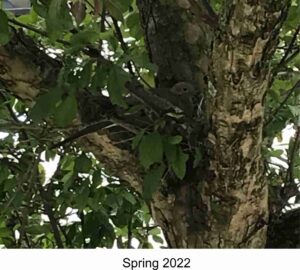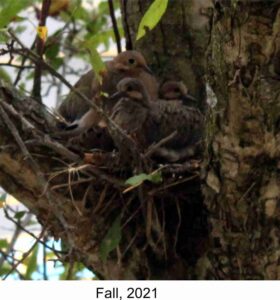It’s always nice to take a lighthearted journey through nature in the midst of a hectic and sometimes troublesome day. Such moments are like a cool breeze after a long, hot spell and can often be a reminder of the One who, while gifting us with what we call nature, allows us to feel His presence in nature and have a deeper knowledge of who He is as our Creator.
“But ask the animals, and they will teach you, or the birds in the sky, and they will tell you; or speak to the earth, and it will teach you, or let the fish in the sea inform you. Which of all these does not know that the hand of the LORD has done this? In his hand is the life of every creature and the breath of all mankind.”
Job 12:7-10
So come with me and enjoy some lightheartedness in the midst of God’s creation!
* * * *
I’m sure we’ve all witnessed the familiar—often soundless—scene above our heads in the summer sky: a small bird chasing a large bird. In our busyness or perhaps lack of interest, we may fail to notice or dismiss the moment and continue on with our daily day. Of course, I realize that the world of birds—and animals for that matter—is full of similar scenes: the need to protect ones young from predators. But somehow, in some way, I can’t help wondering if we are missing out on yet another reminder of the Creator of the universe, the One who instills in the tiny bird the ability to protect its young at all costs.
 Meet our resident Mourning Dove! It quietly and faithfully sits on its nest in the tree in front of our balcony window unobserved from human eyes (except mine and Doug’s), waiting for its eggs to hatch. The dove would be entirely invisible but for the occasional blink of its eye or fluff of its feathers. The mate often sits on our balcony railing, watching, not just the surrounding world, but us! Somehow both seem to recognize that we are not a threat. We can’t say for certain that they’re the same doves that arrive in our tree each spring, but we do know that the nest is inhabited each year and babies are born. Last year they had two sets of twins, early spring and late fall.
Meet our resident Mourning Dove! It quietly and faithfully sits on its nest in the tree in front of our balcony window unobserved from human eyes (except mine and Doug’s), waiting for its eggs to hatch. The dove would be entirely invisible but for the occasional blink of its eye or fluff of its feathers. The mate often sits on our balcony railing, watching, not just the surrounding world, but us! Somehow both seem to recognize that we are not a threat. We can’t say for certain that they’re the same doves that arrive in our tree each spring, but we do know that the nest is inhabited each year and babies are born. Last year they had two sets of twins, early spring and late fall.
I will acknowledge that Mourning Doves are not in the “Most Popular Birds” category. In fact, they are often disliked and belittled, likely because of their relationship with their cousin, the pigeon. Even so, they are worthy of our mentioning—after all, God did create them, and I thought it would be fun to share a few did-you-know facts (thanks to various internet sources) that might peak your interest ever so slightly when next you observe one!
★ Did you know that Mourning Doves are strong fliers, capable of speeds up to 88 km/h (55 mph)?
★ Did you know that a Mourning Dove sleeps with one eye closed? When this happens, half its brain sleeps and the other half stands guard.
★ Did you know that the male utters a distinctive, plaintive cooOOoo-wooo-woo-woooo to attract a female?
★Did you know that Mourning Doves are monogamous! Once they begin collecting all of the materials for the nest, the two birds will become inseparable.
★ Did you know that when they are mating and taking care of the eggs, the couple will roost together every night.
★ Did you know that both male and female doves will incubate the eggs together, which can take upwards of 2 weeks. The parents may go on to have up to five or six broods of babies in one season, depending on the region where they are nesting.
★ Did you know that they will take turns sitting on the eggs, but more often than not, the female will do this during the night, and the male will take his turn throughout the day.
★ Did you know that baby doves are called squabs?
★ Did you know that Mourning Doves eat a 90% seed-based diet? They eat the seed whole and crunch it in their crop (an extension of a its esophagus used to store excess food prior to digestion).
★ Did you know that doves do not feed their babies insects but provide crop milk (a semi-solid excretion that is made by the shedding of fluid-filled cells from the lining of its stomach-like pouch). Both parents can produce crop milk, so both are able to feed their babies. This is done by opening their mouths wide and allowing the squab to stick their little heads in and suck it up through their bills like a straw.
★ And finally, did you know that the Mourning Dove is also called a Turtledove?
“The flowers appear on the earth,
the time of singing has come,
and the voice of the turtledove
is heard in our land.”
Song of Solomon 2:12
“Worthy are you, our Lord and God,
to receive glory and honour and power,
for you created all things,
and by your will they existed and were created.”
Revelation 4:11
Enjoy these early summer days, and thanks for coming along with my lighthearted musings!



Follow Me!